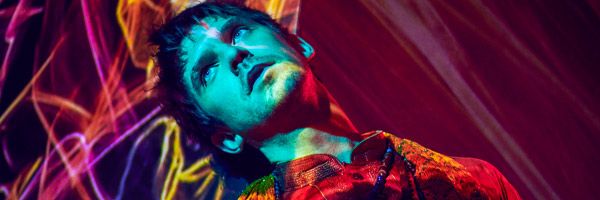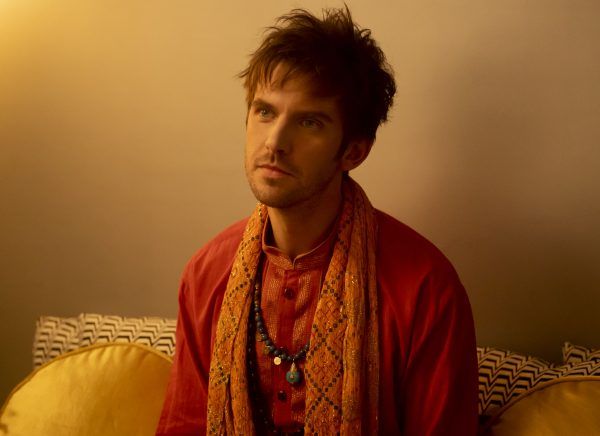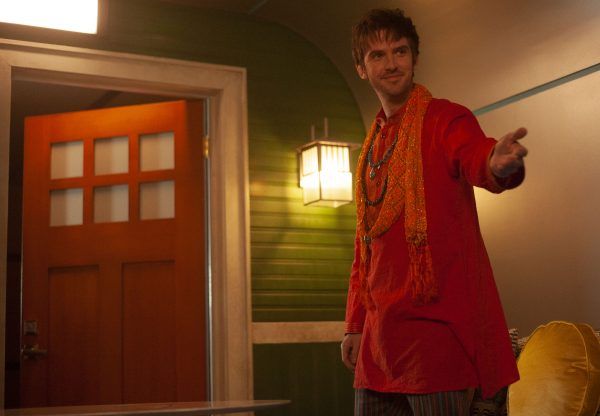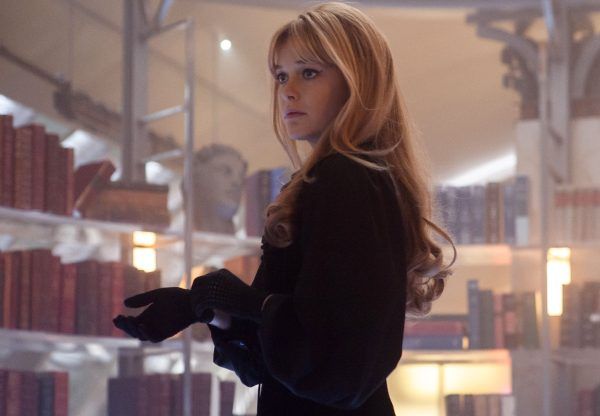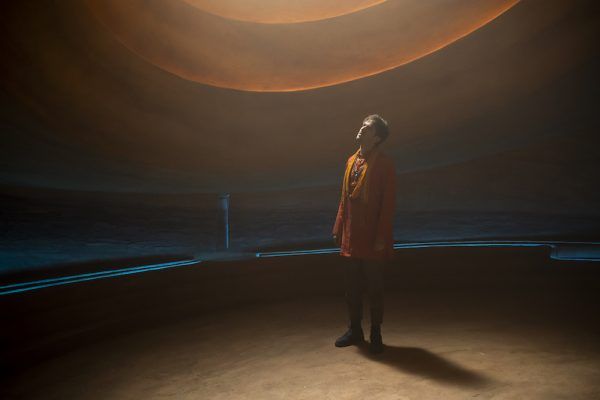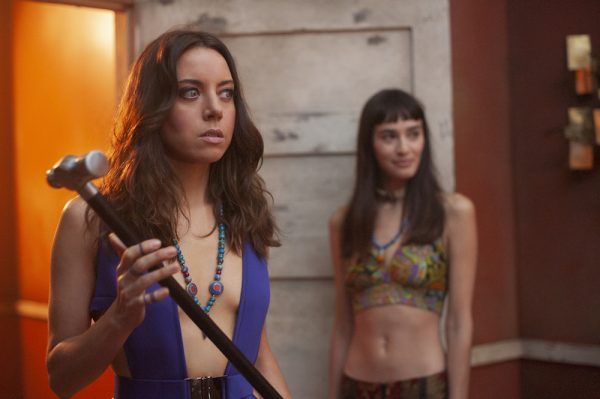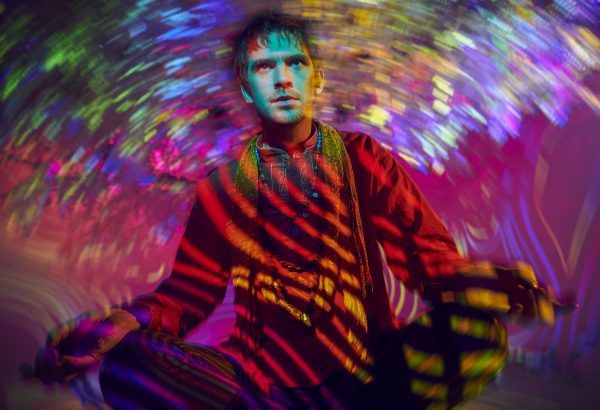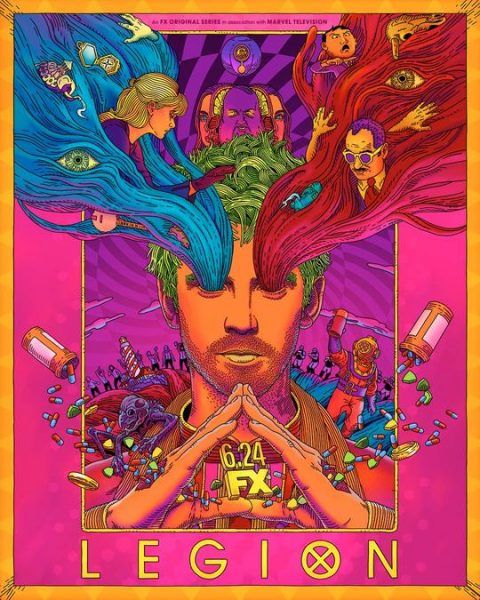From show creator Noah Hawley and Marvel Television, the FX drama series Legion is back for its third and final season, as David Haller (Dan Stevens), a man who believed himself to be schizophrenic only to discover that he is the most powerful mutant the world has ever seen, is forced to confront his actions and the decisions that he’s made. With the dark voices in his head lusting for power and at odds with everyone he once considered a friend, David is now leading a commune to satisfy his need for adulation and he’s enlisted the help of the young mutant Switch (Lauren Tsai), with the hope that she can help him time travel and repair the damage that he’s caused.
While Season 3 was still shooting, Collider got the opportunity to tour the incredible sets at Paramount Pictures in Hollywood and participate in a series of interviews to talk about all things Legion. Here are the highlights from what Dan Stevens had to say, during both that interview on the set, as well as in a 1-on-1 prior to that, where he talked about saying goodbye to this character, why three seasons feels like the right amount of story to wrap things up in, the nature of David’s condition, whether viewers should hate his character after the actions he took last season, the relationship dynamic between David and Syd (Rachel Keller), Switch’s purpose, the status of things for Lenny (Aubrey Plaza), getting to learn about David’s parents, the musical nature of the series, and how he felt about the way it all ends. He also talked about working with Noah Hawley on his feature directorial debut, Lucy in the Sky, opposite Natalie Portman. Be aware that there are some spoilers discussed.
How does it feel to do the last season of this show and have to say goodbye to this character?
DAN STEVENS: It’s a real privilege, in a way. I’m extremely proud of having been a part of something so uniquely weird. The fact that we managed to get three seasons is a wonderful thing. Noah [Hawley] always pitched it to me as a three season story arc. Obviously, we weren’t allowed to say that, at the beginning, because everybody, in this age feels like things should run and run, but to have a story with a beginning, middle and end, that’s so uniquely crafted, is something that I feel will exist out there. I wouldn’t be intimidated to take on a three season show and be like, “Somebody told me about this show Legion, so I’ll give that a go.” If it was like 19 seasons, I’d be like, “Ugh, I’m not gonna watch that,” and one season would not be enough. So, we’re gonna have 26 chapters of this thing, and I’m just so happy to have been a part of it, with a uniquely weird and talented bunch of people behind it.
Does it feel like eight episodes is a good amount to finishing telling this story in?
STEVENS: I think so. We did eight the first season, 10 the second, and then eight now. So, 26 chapters is good novel length. If you look at Legion, the comic book character, I don’t think 20 seasons would do justice to what’s going on, up in his psyche. But to get to dance and play, a little bit, with the kind of character that he is and the kind of narrative possibilities that affords, using and abusing other people’s special gifts, coming to terms with his own powers, coming to terms with his origins, and dipping in and out of a corner of the X-Men universe that people were vaguely familiar with, but also dancing away from it.
At what point were you told where David’s story would end?
STEVENS: Right at the beginning. Noah always saw this as a three-season arc. He sold it with certain imagery that we’ll revisit, that I think will give it a really nice arc, which all great stories have. Good stories have an ending. They don’t just stop. It’s respectful to the art of storytelling, that we have this three-seasons shape. So, I knew where it was going, I just didn’t know how. Every script has still been a massive, delight and surprise. There’s never anything expected about the writing that comes in from Noah and his team, so it keeps you on your toes.
In the comics, the nature of David’s condition would change. Does it feel like he’s consistently in the same condition, or has it progressed?
STEVENS: I would say it has progressed. In some of the comics, sometimes it’s multiple personality disorder, sometimes it’s paranoid schizophrenia, and sometimes it’s something else. Ultimately, it’s none of those things because he’s a mutant, and his mind has been occupied by Amahl Farouk. I believe medical science has not got a name for exactly what that is, but medical science doesn’t really have a name for a lot of things that are not too dissimilar. That’s part of the point. Doctors are going to call David’s condition all sorts of things, but it’s none of them. We get to be playful with some of those symptoms, and really just produce some of the experience of some of those things. The more David understands his own condition and his own makeup, our appreciation of what’s up with him changes, and narratively it changes, as well. We start to see more of what’s inside. Going from Season 1, it just seemed to be this guy who was really having a tough time, mentally, but now we get to really dig inside and bring some of that out, and I get to bring some of that out, as well, which makes for a playful narrative, for sure.
David has done some messed up stuff.
STEVENS: Yes.
There’s a sliding scale of good and evil, and a lot of gray areas in between, on this show. Do you think that David is redeemable and/or forgivable?
STEVENS: That’s a good question. The nature of Legion, the character, is that he’s both this hero and anti-hero figure. There’s a diabolical sense of mischief, through the comic book storylines that you find with him, and that’s what makes him such a treat to play. It’s that dichotomy. Whether I think he can be redeemed or should be, is not really for me to say. He wants to. He wants to see if he can undo this unholy mess, partly that he’s created, and partly that was created for him in his makeup. And so, we introduce this element of time travel with, can David go back and change the past? Can he change some of these awful things that he’s done? That’s one way of attacking the problem. And then, Syd confronts him with this very sophisticated element of, “Yeah, you can go back and change all of these things, but does that really change who you are, as a person?” That, to me, is a really interesting way of tackling that problem.
Especially after what David did to Syd, at the end of last season, does he feel different this season? Should audiences hate him now?
STEVENS: Some people will, for sure. It was definitely a very dark turn, and a lot of this season is about dealing with that dark turn. How does he reconcile that? How does he come to terms with that? He wants to believe he’s a good person, he wants to try to fix things and he wants to make things right, and yet he’s done horrible things. Some of that, he can attribute to possession, but it’s not that. He’s made some really, really bad choices. So, can somebody who’s done these bad things still be loved? Are they still worthy of love? How is he gonna fix this uniquely weird state that he’s in? It’s a strange one. Those are big questions, and Noah is keen to confront them, head on. He’s not shying away from that. I think people were surprised to find something like that happening, in such a magical, realist, fantastical space. How does that get dealt with, in that space?
We’ve gotten to know and like this character, so it hurts, all the more.
STEVENS: Yeah. If people are angry at David, they should be. I think he’s pretty angry at himself, a lot of the time. It certainly makes for a powerful story, and it makes the journey very interesting. It’s not a childish story, by any means.
Once a character gets to a place where they have to keep telling people that they’re a good person, then chances are that maybe they’re not anymore.
STEVENS: Yeah. I don’t know. He’s trying to convince himself somehow, but he’s also still dealing with his origins, and exactly why he is like he is. That, all along, has been one of the big themes. The narrative of our lives is how we’re defined by what other people tell us we are, and also by what we, ourselves, tell us that we are, and how those two things match up.
How would you describe the relationship between David and Syd, in this last season?
STEVENS: They’ve certainly been driven apart, and it haunts him. She changed his life, there’s no doubt about it. He was deeply, deeply in love with her, and there was a real genuine innocence and beauty and hope in that relationship with Syd, that was really corrupted and perverted, towards the end of the second season. It was a bold way to go. People were behind that relationship. It’s interesting to confront audiences with what they want to happen and what actually does happen, and whether you can reconcile those two things. That made a lot of people uncomfortable, too.
Is David recruiting a time traveler to regain the love that he feels is missing, or does he need followers and acolytes?
STEVENS: The love junkie side of him is sated by this community and commune that he’s set up. He gets that acolyte adulation, and they get this extraordinary chemical that he’s able to produce, that makes everybody blissful and very high. That’s going on, all the while, and Lenny’s quite happy with this set-up. It’s the best that her life’s ever been, being his right-hand woman. But in the background, he’s looking for a way to actually go back and fix the fundamental love issue that he’s had, both with his parents and with Syd. He wants to see what he can fix there.
What can you say about David’s relationship with Switch? Does he see a kinship in her, or is she just a means to an end for him?
STEVENS: That’s an interesting one. We’ve seen him with Syd, all this time, and Syd and David really aren’t together much anymore. And then, this new girl arrives and you think, “Oh, is this going to be a romantic thing?,” but you do learn that it’s more of a means to an end. There are flashes of it, but it depends on which way the wind is blowing for David, as to whether he feels any humanity or empathy towards people, or whether he’s just blitzing through and destroying everything. But Switch is a wonderful, curious creation. And Lauren [Tsai], who plays her, is an amazing discovery. Noah’s very good at finding good people like that, in strange places. She comes with this incredible curiosity and wonder, and a strange air about her, as you’d have, stepping into Season 3 of Legion, in any role, but it perfectly suits Switch. So, they have this curious buddy journey, for quite a few of the episodes.
Are there consequences for her, for helping your character?
STEVENS: Sure, she suffers greatly.
Does David care?
STEVENS: Ultimately, no. You think he might for a bit, but no. She suffers terribly, just to help him. It’s the mutant bond and this feeling that she can finally use her gift for something greater, which ultimately is just David on his selfish journey. It’s that odd hero/anti-hero thing that you get, the whole time. You’re never quite sure. There are some scenes that are quite sweet and tender between them, and some where he’s really not. It keeps me on my toes.
The David-Lenny relationship keeps getting a reset. Where are they at, this season?
STEVENS: In this loved up commune, Lenny occupies the [Ma Anand Sheela] character role to the Bhagwan from the documentary Wild, Wild Country. That was how we discussed it, in those early days. We had both recently seen that documentary, and it was like, “Oh, wow, yeah. It’s really like that.” She’s occupying quite a lot of power, and really enjoying life as the right-hand woman to David’s weird guru. He’s in a strange place. It’s a very different David than we’ve seen previously, in this commune. Everybody seems full of adulation for him, and he seems a little bit spaced out and tripped out. And then, we learn that, all the while, he’s been plotting how to get back and how to redeem things, and Lenny’s not so keen on that. She’s actually, for once, okay with the status quo. That develops, for sure. They’re great characters. I love that relationship.
We know that David’s dad shows up this season. What can you say about the exploration of that relationship?
STEVENS: It’s been on his mind, since day one, really, and it’s been teased. It’s quite exciting to see. It’s the third incarnation we’ve seen of Professor X, with Patrick Stewart and James McAvoy. It’s cool. It’s this canonical role now, that [Harry Lloyd] is taking on. Those scenes that I have with him, with David opposite his father at a very similar age, it’s trippy stuff. It’s a nice resolution to that relationship. There’s a lot of confusion and hurt, obviously, in that direction. So, there are a few episodes, towards the end, where we see that harmony, and a discussion of that whole thing, which is really lovely.
But he has a lot of daddy issues.
STEVENS: Sure, yeah.
What’s it like to explore this particular iteration of Professor X and his relationship with your character, but also, in a larger sense, having this very iconic character, that’s a through-line for all X-Men stuff, in this particular universe?
STEVENS: The bubble of Legion is, even in the comics, is quite tangential to a lot of the main X-Men narrative. Whenever Legion shows up, things get really weird, really quickly, and a lot of worlds are turned upside down, sometimes literally. We have always been quite comfortable in this odd pocket. It’s nice, in this three-season structure, to finally have a string that ties our crazy balloon to the main raft of the X-Men stories. I think that will be satisfying for people who know and love X-Men and Legion. It’ll also make anybody who’s watched the show – and there are quite a few people who’ve watched the show, who have no knowledge of the Marvel of it all – curious, and it might cause them to go and watch some other X-Men-y type of things. Having surprised so many people with the unique look and style of the show, to bring it back to that universe is quite fun and satisfying.
How much free will does David have, given his childhood, his illness and his powers?
STEVENS: It’s about, how much can you attribute unspeakable acts to a disturbed childhood, and how much is your own volition? That’s a massive part of David’s struggle. By keeping it selfish, we get to really examine somebody who is struggling with that question. How much was it Farouk, sitting at the helm of this thing, wreaking havoc, and how much of it was inherited from his parents and is purely genetic? He didn’t know that he’s got Charles Xavier’s mutant genes, and also his mother’s mentally unstable genes, as well, plus Farouk, taking over. That’s part of the puzzle of it all, which is fun to unpick.
What will we see of the dynamic between David and his mother?
STEVENS: It’s really beautiful, that whole thing. As with a lot of adopted people, the mother figure is extremely important. Her storyline is a mixture of genres, really. There’s this almost stand-alone episode, which I think is Episode 3, where we learn about how she and Charles met. It’s almost a period episode within Legion, where we go back and learn a bit more about her. I had that episode off. And then, David gets to meet her and piece it together. It’s haunting and quite beautiful, which is a nice element and shade to add to the whole kaleidoscope of this story.
You’ve said previously that you had conversations with Noah about how the show’s storylines relate to topical political issues. How do these storylines resonate in the world?
STEVENS: People are always looking for relevant themes that give a show currency. I think this show very much takes place in an abstract, fantastical space. A lot of the themes that have come out of the show are uncanny coincidences, but I don’t think there was any direct design to reflect specific news headlines. That said, Legion is a show that facilitates an extremely unusual narrative, and a very unusual viewing experience. And the world has become a pretty unusual narrative viewing experience, in the last three years, since we started making the show. I can’t say, one way or the other, that they’re directly linked, but there are some uncanny parallels, for sure.
Last season, you had so many musical moments. What’s it like to do that, in a story like this?
STEVENS: It’s a wonderful show, from that perspective because the psychedelic nature of it allows for extreme playfulness in the writing, in the design and in the camera work, but also acoustically. One of the things that blew me away, when I first heard the finished sound mix of the first season, was seeing that first episode in a big cinema with great sound. The things that were going on, all around, blew my mind. They were not there on the day. That was all in the mind of Noah and the sound mixers. Musically, Noah and Jeff Russo have a great time. A lot of those smoky-voiced covers of emo and ‘80s tracks that you hear are Noah, which is, in itself, a remarkable thing. I don’t know many showrunners who sing on their own shows. But for us, to get to be able to express a moment through a Pink Floyd song or a Who song is very cool. It can be very useful. It’s also very strange and wonderful, and adds to the wacky color of the show. And any show that allows Bill Irwin to dance is just great, in my mind. He’s a wonder. We’ve got some more Bill dancing. And there’s a lot more singing, this season. There’s a lot more music this season, and it’s great.
Noah has said that the show is a story about David and Syd. How do you feel about the resolution with the relationship with Syd, and the trajectory that it’s gone on, over the course of the three seasons?
STEVENS: I think it’s handled with complexity and with sophistication. It’s not trying to be too clear-cut about these things. For such a bizarrely structured show, to throw something like that into the mix, really intensifies how creative, colorful and sophisticated a show like this can be. One of Noah’s great aims, really, was to change the way that these kinds of stories are told, and for them to not be black and white, good and evil, and with everything resolved with kicking, punching and weapons. So, it’s been very, very interesting to navigate, and it’s certainly kept all of us very, very engaged, with how sensitively that needs to be handled.
What was your reaction when you got the final script and found out how it was all going to end?
STEVENS: I thought it was beautiful. It’s not too redemptive, in any way, but it does bring the story to a resolution, which gives it sense and meaning. I knew where it would end up, but how it got there, and specifically in that final hour, is really delicately done, very beautiful, and quite hopeful and sad. I think it will be wonderful. It’s nice to feel that the story has an arc, and has an end.
Before doing Legion, could you have ever pictured yourself doing this kind of project?
STEVENS: Not really because it didn’t exist. There were elements of this character in the show, where I could have said, “Yeah, I’d love to play that kind of character.” But there are a lot of great shows, like The Americans, where you get to play a multiplicity of characters. That’s a real actor’s dream, to get to do that in such a creatively frenzied environment, where your design team, your camera team and your costume team are really fired up by what’s coming in and the challenge to make something that’s so visually unique. They are like 500 shows out there now, and this doesn’t look like any of them. It’s a privilege to be able to say that, it really is. Legion just had its moment at a really special time, when storytelling could do this and when there was an appetite for this kind of show, when people are questioning reality and truth, out in the big, wide world. It’s a pretty weird world now, and Legion fits right in there. I’m really proud that it’ll exist as this document to a time of some pretty interesting long-form narrative television.
How has this experience challenged you and changed you, as a person?
STEVENS: I would say massively. Noah promised me something weird and beautiful, and also something that would be challenging and never boring, and he’s fulfilled on absolutely every one of those counts. It’s been extraordinary. It’s left me very open to a lot of new challenges. The way that we’ve been challenged, in every episode of this, in different ways, and the ways that you can navigate a relationship with another character, is constantly changing. The affect of this narrative on the way that I think all of us process a script, and process the way that we approach storytelling, has been really quite revolutionary. There’s not another show out there that does that tortures its cast in quite that creative a way, but that’s what’s made it so great and so rewarding.
Noah Hawley also wrote and directed Lucy in the Sky, which you’re in, as well. What was it like to work with him, in that capacity?
STEVENS: It was very different. It stars Natalie Portman, Jon Hamm, Zazie Beetz, and myself, and it has a unique Noah Hawley style to its storytelling, too. It’s not the full-blown psychedelic trip that Legion is, but there are elements of that. It’s been great. Just watching somebody direct their first feature is a real privilege, as is watching somebody go from one kind of storytelling to another. And we’re definitely talking about other things that we’ll do together. Whether it will be quite as much fun as Legion, I don’t know. I’m not sure what could be. But I’m incredibly grateful to him for this amazing three years, and getting to work with a really special bunch of people.
Legion Season 3 airs on Monday nights on FX.

